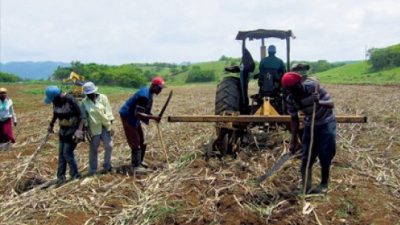Corruption: The Ghost That Haunts Jamaica

Caribbean writer, Martin Munro (2015), utilized literary and metaphorical allusion of ghosts in his anthology ‘The Haunted Tropics: Caribbean Ghost Stories’. The metaphorical allusion of ghosts refers to spatial norms, values, ideologies and predominant practices that hinder the development of many Caribbean countries, including Jamaica.
The recent incidents of the Jamaica’s Minister of Justice, Delroy Chuck’s unsavoury comments about the non-investigation of family members and spouses of the political officials by the Integrity Commission (IC) and the Auditor General’s recent finding that estimated JS$3 trillion of dollars have gone unaccounted for across sixteen (16) government agencies and ministries for the last eleven (11) years have brought to the foreground that not only is corruption a rampant staple in our country’s political affairs but it is a perennial ghost that thwarts our economic and social development. Data from the Caribbean Policy Research Institute (CAPRI) has shown that corruption reduces foreign direct investment (FDI) in key or higher-valued added sectors that promote productivity and economic growth.
Corruption significantly erodes our citizens’ trust in public officials and the legitimacy of political institutions. This is evident in the fact that Jamaica has registered scores below 50 on Transparency International’s Corruption Perception Index from 2007 to 2023, which means that our country has a serious corruption problem. The 2024 BTI Transformation Index for Jamaica has also illustrated that as a result of a litany of public corrupt practices and scandals involving politicians, there are low levels of trust among citizens of Jamaica in public officials.
Minister Delroy Chuck’s comments about the parameters of the investigation by the Integrity Commission do not only represent serious efforts by the government administration to weaken the anti-corruption capacity of the Integrity Commission but are also shameless. His comments are shameless and misguided because the government administration of which he is a part, particularly, Prime Minister, Dr. The Most Honourable Andrew Holness has come under serious scrutiny both by citizens and the Integrity Commission.
Prime Minister Andrew Holness was investigated by the Integrity Commission on multiple occasions including but not limited to the vast disparity between ownership of assets and his lawful reported income and deliberately omitting information on his statutory declarations for 2019-2022 to the Integrity Commission. His comments disregard the harsh reality that there are international trends that demonstrate that politically exposed persons (PEPs) such as politicians and high -ranking officials conceal the proceeds of crime in the names of spouses and family members. Despite the fact that Jamaica has made improvements in anti- money laundering and counter terrorist financing and was categorized as “largely compliant” for meeting 33 out of 40 recommendations by the Financial Action Task Force, there are several technical deficiencies in our local compliance framework such as inadequate mechanisms to provide information on national risk assessment.
As it relates to social issues in national development, corruption contributes to growing income and social inequalities and undermines coordinated efforts to reduce poverty. Consecutive standard of living (SLC) surveys conducted by the Planning Institute of Jamaica (PIOJ) have indicated that the wealth of the highest income quintile of households is ten times (10 x) greater than the wealth accumulated by middle and lower-income households across Jamaica. The prevalence of poverty has increased by 5.7% relative to 2019 in the post COVID-19 pandemic context with more disproportionate implications for female-headed households and low-income households in rural areas. These growing forms of marginalization heighten the incidences of social polarization and apathy in our nation.
The calls for strengthening anti-corruption, transparency and accountability among various civil society organizations including the Jamaica Accountability Metre Portal (JAMP) and the National Integrity Action (NIA) not only underscores the importance of establishing institutions that bring procedural justice to our citizens, but there is a dire need for our governance capacity to move away from a politics that predicated on shamefully and wastefully spending public funds without transparency and for private gain. Prioritizing the restoration of trust between our citizens and government and public institutions is an imperative for ridding ourselves from corruption- the ghost that haunts Jamaica!
*
Click the share button below to email/forward this article. Follow us on Instagram and X and subscribe to our Telegram Channel. Feel free to repost Global Research articles with proper attribution.
Tina Renier is an Afro-Jamaican scholar-activist. She is also a Research Fellow for the Sustainable Leadership and Positive Peace Research Fellowship Programme, a UNESCO Inclusive Policy Lab expert and a regular contributor to Global Research. She received a Master of Arts in International Development Studies from Saint Mary’s University in Halifax, Nova Scotia, Canada.
Global Research is a reader-funded media. We do not accept any funding from corporations or governments. Help us stay afloat. Click the image below to make a one-time or recurring donation.


